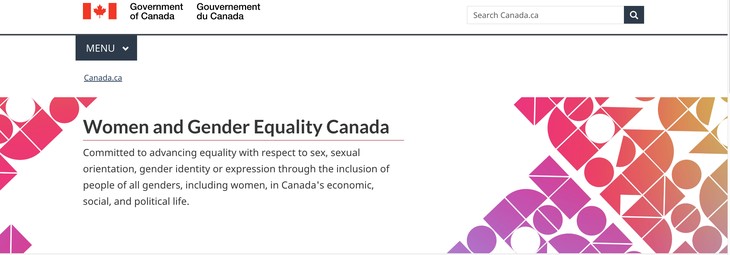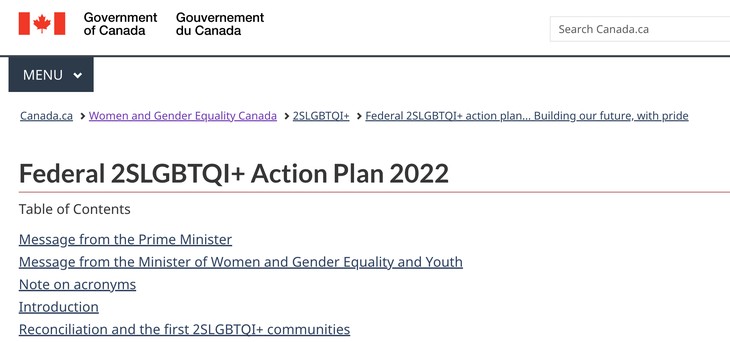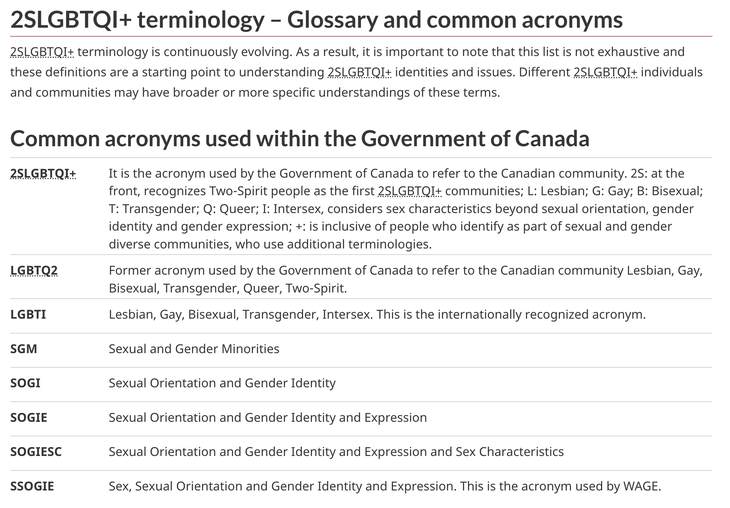The intersectional wars heat up, and it might be fun to watch. Canada is literally reshuffling the alphabet peoples’ acronym and my guess is that a lot of people included will not be happy.
What, exactly, are they doing and why?

Canada has a Ministry called “Women and Gender Equality,” which is ironic since women are plunging toward the bottom of the intersectional pile, and because they exist to confuse the hell out of people and impose ridiculous mandates, they have decided that LGBTQIA+/-WHATEVER is not sufficiently woke, they are going to change the acronym to be more reflective of the intersectional ladder.
You gotta love that artwork; I assume it is intended to reflect that a lot of genders don’t fit together or something.
As part of their initiative to redefine humanity, they found that indigenous people were feeling left out, despite the recent inclusion of “2S” (two-spirit) in the intersectional alphabet.
Hence, the indigenous transgender people get to move to the front of the line.

This led to a “note on acronyms,” because most people’s reaction to the title of their action plan would be, understandably, “Huh, what?”
2SLGBTQI+ terminology and acronyms are continuously evolving. In 2016, the Government of Canada began using the term ‘LGBTQ2.’ The term was applied to the name of the LGBTQ2 Secretariat, the LGBTQ2 Community Capacity Fund, and LGBTQ2 Projects Fund, among other initiatives. LGBTI is often used in an international context. 2SLGBTQQIA+ is the acronym adopted by the 2SLGBTQQIA+ Committee, which contributed to the 2021 Missing and Murdered Indigenous Women, Girls, and the 2SLGBTQQIA+ People National Action Plan.
During the engagement process, 2SLGBTQI+ communities in Canada called for the acronym used by the Government of Canada to be updated. The Government of Canada will adopt and encourage the use of 2SLGBTQI+ as a more inclusive term. This includes changing the name of the LGBTQ2 Secretariat to the 2SLGBTQI+ Secretariat, which is the title used throughout this Action Plan.
“2SLGBTQI+ terminology and acronyms are continuously evolving.”
You bet the terminology is constantly evolving. Fast enough to make your head spin, and as I have been pointing out, this is part of the point. It both confuses you–making you feel weak and unable to fully grasp what is going on–and disconnected from any solid reality.
You become dependent upon others to define what can and cannot be said, what things mean, and what things really are, and are always on defense.
You literally are unable to converse with certain people without constantly asking for their help to get it right. They are authorities, and you are acolytes. At least that is what they want. “Do the work!”
A lot of “experts” intentionally use acronyms and obscure language to put others in their place. While technical terms and acronyms often serve a legitimate purpose, they also are potent weapons for taking power in a conversation. If one is able to keep the other off solid ground, it is much easier to BS the other person.
Constantly changing acronyms and terminology multiplies the effect.

How do you argue with somebody when you literally can’t understand the language?
The alphabet ideology depends upon keeping people in a constant state of confusion. It makes people feel impotent and keeps us worried about stepping on cultural landmines that could explode in our faces. We are told that we must use the right terms in order to treat people properly, and also told that those terms constantly change.
The government helpfully has a glossary of (currently) acceptable terms. Perhaps one should check it every day to see what works and what doesn’t at any given moment.
Glossary
- Aromantic
- A person who lacks romantic attraction or interest in romantic expression. An aromantic person’s sexual and romantic orientations may differ (e.g. aromantic lesbian), and they may have romantic and/or sexual partners.
- Asexual
- A person who lacks sexual attraction or interest in sexual expression. An asexual person’s sexual and romantic orientations may differ (e.g. biromantic asexual), and they may have sexual and/or romantic partners.
- Biphobia
- The fear, hatred, or aversion of people who are attracted to more than one gender.
- Bisexual/Biromantic
- A person who is sexually and/or romantically attracted to two or more genders.
- Cisgender
- A person who identifies with the gender they were assigned at birth.
- Gay
- A person who is sexually and/or romantically attracted to people of their same sex or gender identity. Traditionally this identity was reserved for men, but it has been adopted by people of all gender identities.
- Gender-fluid
- A person whose gender identity varies over time and may include male, female and non-binary gender identities.
- Heterosexual/Heteroromantic
- A person who is sexually and/or romantically attracted to people of a different gender than themselves.
- Homophobia
- The fear, hatred, or aversion of people who experience same-sex attraction.
- Homosexual (*no longer commonly used in English)
- This term is no longer in common use. See “gay” and “lesbian”. The term homosexual has fallen out of favour as it is associated with the historic medical understanding of same-sex attraction as a mental illness. However, equivalents of “homosexual” are commonly used in French and other languages.
- Intersex
- An umbrella term to capture various types of biological sex differentiation. Intersex people have variations in their sex characteristics, such as sex chromosomes, internal reproductive organs, genitalia, and/or secondary sex characteristics (e.g. muscle mass, breasts) that fall outside of what is typically categorized as male or female.
- Lesbian
- Typically a woman who is sexually and/or romantically attracted to other women.
- Non-Binary
- (also ‘genderqueer’). Referring to a person whose gender identity does not align with a binary understanding of gender such as man or woman. It is a gender identity which may include man and woman, androgynous, fluid, multiple, no gender, or a different gender outside of the “woman—man” spectrum.
- Pansexual
- A person whose choice of sexual or romantic partner is not limited by the other person’s sex, gender identity or gender expression.
- Queer
- Historically a derogatory term used as a slur against 2SLGBTQI+ people, this term has been reclaimed by many 2SLGBTQI+ people as a positive way to describe themselves, and as a way to include the many diverse identities not covered by common 2SLGBTQI+ acronym.
- Questioning
- A person who is uncertain about their sexual orientation and/or gender identity; this can be a transitory or a lasting identity.
- Gender Dysphoria
- A medical diagnosis often required by health providers and/or health insurance plans before prescriptions for hormones or gender affirming surgeries will be provided. It can be understood as discomfort or distress experienced by a person who feels their sense of their gender identity differs from their body, based on societal expectations.
- Gender Expression
- Gender expression refers to the various ways in which people choose to express their gender identity. For example: clothes, voice, hair, make-up, etc. A person’s gender expression may not align with societal expectations of gender. It is therefore not a reliable indicator of a person’s gender identity.
- Gender Identity
- Internal and deeply felt sense of being a man or woman, both or neither A person’s gender identity may or may not align with the gender typically associated with their sex. It may change over the course of one’s lifetime.
- Sexual Orientation
- Romantic and sexual attraction for people of the same or another sex or gender.
- Transgender
- (also ‘trans’). A person whose gender identity differs from what is typically associated with the sex they were assigned at birth.
- Transphobia
- The fear, hatred, or aversion of people whose gender identities differ from the sex they were assigned at birth.
- Transsexual (*no longer commonly used)
- This term is no longer in common use, though may be more frequently used by transgender individuals of an older cohort. The term defines a person whose gender identity differs from their sex assigned at birth and who has undertaken gender affirming medical and/or surgical interventions. The term has fallen out of favour as it implies that physical transition is necessary in order to claim a trans identity.
- Two-Spirit
- (also Two Spirit or Two-Spirited). An English term used to broadly capture concepts traditional to many Indigenous cultures. It is a culturally-specific identity used by some Indigenous people to indicate a person whose gender identity, spiritual identity and/or sexual orientation comprises both male and female spirits.
The gender wars–or, alternatively, “the civil rights battle of our time”–are only peripherally about the rights and behaviors of various non-conforming people.
The people are not the issue for the true alphabet warriors: it is non-conforming. Constantly changing the rules, keeping people confused and off balance is the goal.
Do you really think that the Biden Administration cares deeply about adult men who just want to be respected for their fetish of wearing diapers and pretending to be 6 months old? Are we to worship at Sam Brinton’s feet because Biden and company honestly think he looks fabulous?
No. It is about keeping the rules changing and getting people used to being compliant.
One of Star Trek: The Next Generation’s most famous episodes is called “Chain of Command,” and this theme was prominent in the plot. Captain Picard is kidnapped and tortured and promised an easy life if he only chooses to accept that a false thing is true. It is the simplest thing: see 5 lights when there are only 4. If only he does that he will live in comfort.
Picard refuses and condemns himself to torture to maintain his grasp on reality.
This is exactly the deal the powers that be demand: accept their version of reality and they will (mostly) leave you alone, except when they invent new demands. Keep complying and all will be well.
This is why the elite has sided with the most insane people in our society. It is not that they actually fully believe this BS, but because they need you to. They get to choose our reality.
We must comply, or else.








Join the conversation as a VIP Member